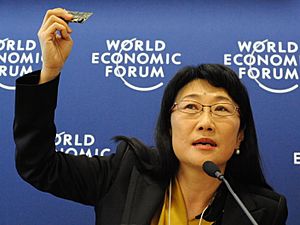Cher Wang facts for kids
Quick facts for kids
Cher Wang
|
|
|---|---|
| 王雪紅 | |

Wang at the World Economic Forum on 23 January 2008
|
|
| Born | 14 September 1958 Taipei, Taiwan
|
| Education | University of California, Berkeley (BA) |
| Occupation | Entrepreneur |
| Years active | 1997–present |
| Employer | HTC, VIA Technologies |
| Known for | Contributions to HTC and VIA; creating a fairly early model of smart phones in 1997 |
| Spouse(s) | Chen Wen-Chi |
| Children | 2 |
| Parent(s) | Wang Yung-ching Jiao Yang |
| Relatives | Cherlin Wang |
Cher Wang (Chinese: 王雪紅; pinyin: Wáng Xuěhóng; born 15 September 1958) is a successful businesswoman and entrepreneur from Taiwan. She helped start two big technology companies: HTC Corporation and VIA Technologies. HTC is famous for making smartphones, and VIA Technologies makes computer chips. Cher Wang is known as one of the most successful women in the world of computer technology. Her father, Wang Yung-ching, was a very wealthy businessman who founded the Formosa Plastics Group.
Contents
Early Life and Education
Cher Wang was born in Taipei, Taiwan, on September 15, 1958. She went to high school in Oakland, California, at the College Preparatory School. Later, she studied economics at the University of California, Berkeley. She earned her bachelor's degree from there in 1981.
Her Amazing Career in Tech
Cher Wang started her career in 1982 at First International Computer (FIC). She then co-founded VIA Technologies in 1987. Ten years later, in 1997, she also helped create HTC. Both companies have played a big role in the world of smartphones.
In 2011, Forbes magazine named her and her husband, Wen Chi Chen, as the wealthiest people in Taiwan. She has also been listed among the most powerful women in the world by Forbes. In 2014, she was ranked as the 54th most powerful woman globally.
VIA Technologies faced some legal challenges regarding one of its products, a chip called VT3421. There were concerns about how this chip worked. The company went through several court cases and was eventually fined. These legal issues were carefully reviewed by different courts.
In March 2015, Cher Wang became the CEO of HTC. She took on the daily management of the company. In September 2017, HTC and Google announced a major partnership. As part of this deal, some HTC employees joined Google. Google also received a license to use some of HTC's technology.
Giving Back: Philanthropy
Cher Wang is also known for her charity work. Her charity foundations hold investments worth over US$200 million. In 2011, she donated US$28.1 million to help start Guizhou Forerunner College in China. This college offers free or low-cost education to students from families with lower incomes. Wang hopes to open more such colleges if this one is successful.
She has also given a lot of money to the University of California, Berkeley. Her donations help support a special award for scientists who make important discoveries in physics. This award is called the Oliver E. Buckley Condensed Matter Prize.
Cher Wang and her husband also support a program between UC Berkeley and Tsinghua University in Beijing. This program helps professors and students from both universities work together on psychology research. In August 2012, Wang donated 6,000 HTC Flyer tablet computers to 60 high schools in Taipei.
Personal Life
Cher Wang is a Christian. Her husband, Wen Chi Chen, is the CEO of VIA Technologies. They have two children. Cher Wang prefers to keep her personal life private. However, she has been involved in Taiwan's politics. She has supported political leaders and ideas in Taiwan.
 | George Robert Carruthers |
 | Patricia Bath |
 | Jan Ernst Matzeliger |
 | Alexander Miles |

